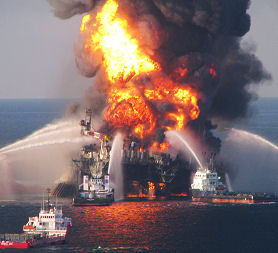BP to publish findings of oil rig probe
As BP prepares to publish a report into the causes of the Deepwater Horizon rig explosion one marine expert tells Channel 4 News it was a major environmental incident but not a catastrophe.

The report published later today is expected to lay blame to BP as well as a number of other companies involved in the rig’s operations.
The findings are expected to accept that BP staff missed key signs that the well was unstable before the 20 April blowout which caused the worst offshore oil spill in history. The oil giant has consistently denied claims it was guilty of gross misconduct.
Mark Bly, BP group head of safety and operations who ran the probe, said in May that people on the rig misunderstood a key test just hours before the blast.
Reports have suggested that BP will also find that failures were committed by other companies involved in the drilling of the Macondo well, including Transocean which owned the rig and Halliburton which was responsible for cementing and securing the well.
BP has declined to comment ahead of the report’s publication this afternoon.
The findings are the first of a number of reports relating to the incident and its aftermath. The US Department of Justice is conducting a criminal probe of the spill, while the US Coast Guard and the US Bureau of Ocean Energy Management are running a joint probe.
More than four million barrels of oil gushed into the Gulf until 15 July, when a cap on the wellhead sealed off the flow.
BP came under intense criticism in the US but the political pressure has eased since the oil firm set up a $20bn dollar (£13bn) fund to meet compensation payouts and costs.
But the oil giant has received praise from some scientists in Britain about its handling of the spill. Dr Simon Boxall, from the National Oceanography Centre, told Channel 4 News BP had set a good precedent: “Basically the clean up has gone very well. A huge amount of resource has been thrown at it because of the media interest.
“This was a major incident but not a catastrophe. Of course for the families of those who died it was a catastrophe, but in terms of wildlife the effect was far less than the Exxon Valdez oil spill.
“The impact will last for months rather than years and most of the wildlife will recover incredibly quickly. I don’t think there will be a long lasting impact.”
The crisis cost former chief executive Tony Hayward his job after a series of PR blunders and he will make way in October for fellow board member Bob Dudley, who becomes BP’s first overseas boss.
The longer-term fall-out such as fines, penalties and potential legal action is also set to add to the bill and spread the pain over a number of years.
BP hopes to sell around 10 per cent of its production assets over the next 18 months, with the aim of raising $30bn (£20bn) to beef up its balance sheet to meet the crisis.
BP has already spent £8bn dollars (£5.2bn) trying to contain the disaster, and has forecast that it will eventually cost the group more than $32bn dollars (£20.9bn), after clean-up costs and compensation are taken into account.